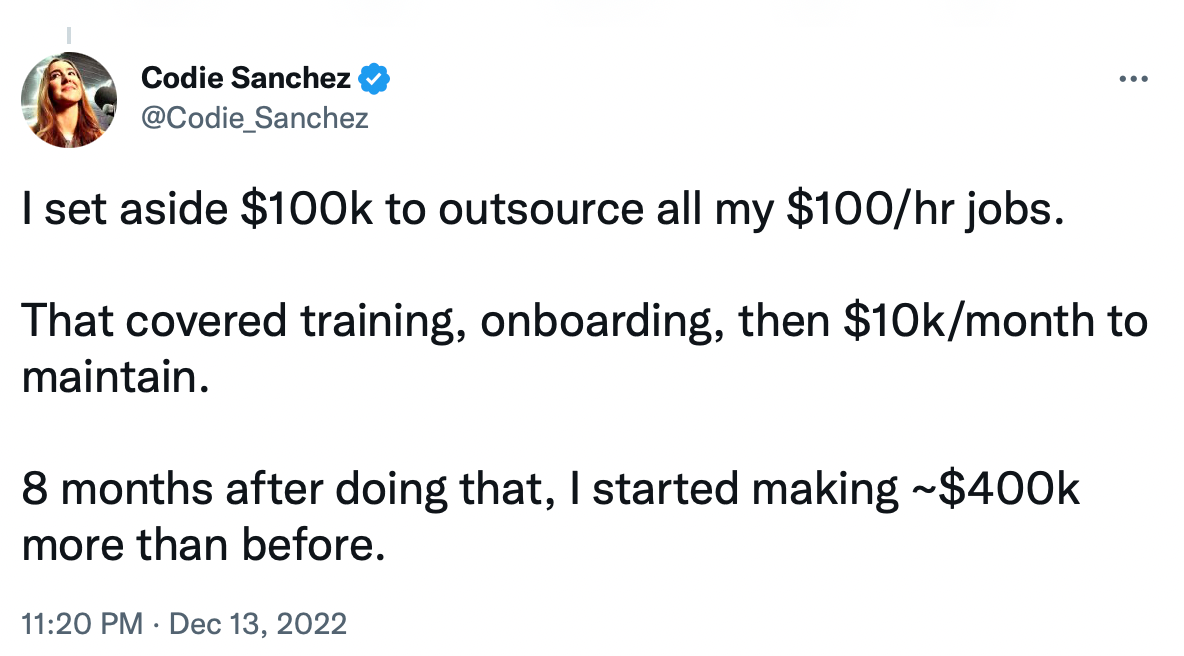The remote talent pool is full of qualified individuals, and thanks to employee outsourcing, they can take bigger tasks off your plate. You just need to find the right people. In this guide, we’ll walk you through the benefits of outsourcing leadership tasks, the qualities that you should look for when hiring remote lead roles, plus quick tips to make remote hiring smooth, easy, and risk-free.
Let’s start by addressing this big question:
Why should you outsource leadership roles?

When you’re just starting, outsourcing “$10/hr” tasks like admin, data entry, and bookkeeping was enough to keep you afloat. But as your business grows, you need to focus on things that need your specific expertise: scaling, building new relationships, and exploring new avenues.
This means letting go of complex tasks like sales, operations, and client relations — and delegating them to team leaders or managers.
Trusting someone else to run these areas of your business can be challenging, especially if you’re a hands-on business owner. But you’d be surprised — delegating leadership roles offers a ton of benefits.
By delegating leadership tasks, you can:
- Free up more time for growth. Without having to work “in” the business, you can now focus on working “on” the business. Instead of getting stuck with busywork, you now have time for building new connections, expanding operations, or just grabbing opportunities that you’ve put on hold.
- Take breaks. You went into business so that you can have time freedom, not to work 60-hour weeks. By delegating leadership roles, you can finally take some well-deserved time off without worrying about anything going up in flames.
- Build something new. Handing off daily operations to leaders gives you more time to work on a new project.
Hiring remote Filipino employees for these roles gives you an even sharper advantage. The Philippine talent pool is full of highly skilled individuals with years of experience, a wealth of knowledge, and a can-do attitude. They can work hand-in-hand with your onshore team to manage remote team members or take ownership of other projects. Bonus: they cost 80% less than local counterparts.
Related: How much can you save when you hire remote assistants?
What leadership roles can you outsource to the Philippines?
Aside from the usual administrative tasks and customer service jobs, you can also hire for leadership roles in the Philippines. Here are some lead positions we’ve hired for our clients over the past couple of years:
- Head of Customer Success - We found Johana, a customer service leader with over 10 years of experience, for a real estate startup.
- Operations Lead - With more than 5 years of experience as a project and operations manager, Paola was the best candidate to lead operations for a content agency.
- Call center manager - We found a call center operator with more than 10 years of experience for a class action law firm.
- Recruitment admin manager - With 20 years of recruitment experience under his belt, Jerome was the perfect candidate for this client.
- Digital marketing manager - As a digital marketing manager, Lisa oversees business plans, conducts market research, and produces marketing collaterals for her client.
- Project manager - Project managers are essential for any growing team. We found a proficient project manager for this business consultancy firm in Zest.
And these roles are just the tip of the iceberg. If the task can be done remotely, then you can delegate it to a remote Filipino professional.
What qualities should you look for when hiring remote lead roles?

If you’re ready to hire for remote leadership roles, here are the qualities that you should look for:
Relevant experience
Want someone to take ownership of a big project or department? Make sure they can back their resumes up with real-world chops. You want subject-matter experts who have years of proven experience under their belts.
Candidates with relevant experience have:
- A ton of technical knowledge - they know the ins and outs of the role. They also know how to maximize the tools needed for the job.
- A good eye for strategy - coming up with a solid strategy takes years of trial and error. These seasoned pros can craft strategies based on what’s worked for them in the past. At the same time, they’re not scared to experiment with new methods.
- Hands-on experience - Ideal leaders don’t dwell on theory alone. Instead, they use their experience and practical knowledge to solve problems and improve processes.
Culture Fit
Apart from technical skills, hire someone who can champion your company’s values. A good leader finds fulfillment in what they do, believes in the organization, and makes sure that other team members feel the same way.
Find someone who shares your work style and philosophy. For example, if you wanna build a company culture that revolves around daily updates and standup meetings, steer clear of applicants who prefer to work asynchronously — and vice versa. Collaboration is easier when you’re both on the same page.
Lastly, excellent culture hires should be able to seamlessly integrate with your existing team members. They should be emotionally and socially intelligent. As leaders, they need to be able to motivate and inspire team members to take action.
💡PRO TIP
Empower employees who go above and beyond to build team culture. They’ll be invaluable in keeping your remote team engaged and productive.
Related: How Somewhere’s Head of People and Culture keeps our remote team engaged
Communication skills

This is a non-negotiable: good leaders must be effective communicators.
They’re essentially the bridge between you, the rest of your team, and your stakeholders, so they need to be able to communicate clearly through different channels like email, chat, or video.
They should also be diplomats. Sometimes, being a leader means delivering tough feedback or even firing someone. The ideal candidate should be able to do this with a balance of objectivity and empathy. This isn’t their first rodeo — they know how to navigate tough conversations with a level head.
They know how to smoothly navigate between cultural differences. Whether they’re communicating with you, your clients, your team, or business partners, the ideal candidate can do so with ease and confidence.
🤔 DID YOU KNOW?
English is one of the official languages in the Philippines. Hiring for a leadership position means you’re getting someone who can speak English fluently across different channels and media.
Learn more: Why small businesses choose to outsource to the Philippines
Project management skills
When you’ve got a lot of things on your plate, you can easily become the bottleneck for team projects and campaigns. One of the best decisions you can make for your business is to hire someone who can oversee these projects for you.
The ideal candidate for a leadership position knows how to prioritize day-to-day tasks and manage them well.
An excellent project leader also knows how to:
- Identify the best person for the job
- Use workflows and automation inside project management tools like Asana, Monday, or Clickup
- Create realistic timelines that don’t burn their team members out
- Oversee various moving parts to make sure that the project is a success
Project management can be pretty stressful, so the ideal leader should also know how to keep their cool. Despite the demands of the job, they make sure that everyone on their team collaborates well, even when they’re working remotely.
People management skills

Lots of employers overlook “soft skills” like people management for technical ability. Don’t make the same mistake. Remember, you’re hiring someone to lead others in your organization. They need to be emotionally intelligent, level-headed, and self-aware to manage people within the team.
The ideal leader should have:
- Strong interpersonal skills. They enjoy creating genuine connections with people. Bonus: your team enjoys their presence, too.
- A knack for mentoring others. They want their direct reports to become the best version of themselves through mentorship and guidance.
- High EQ - According to TalentSmart, emotional intelligence is the highest indicator of workplace performance. This is what sets excellent leaders apart from mediocre ones. Find someone who is not only self-aware but also aware of their relationships with others.
Learn more: 8 soft skills every remote assistant should have
Proactivity
Good leaders don’t wait for potential issues to become full-blown problems. Instead, they take proactive steps to ensure the team’s success. They’re naturally observant — they’ve got their ears on the ground and know when something is up.
For example, if they notice a team member is lagging, they check in as soon as possible to see what’s going on. They help the team member get over roadblocks and check if other members of the team are experiencing the same challenges.
Being proactive helps them manage and minimize risks, as well as create sound decisions for the team.
Accountability
In a remote setting where you can’t physically check in on your employees, accountability is vital. Holding remote team members accountable not only improves productivity — it also builds trust, rapport, and overall team morale.
Good leaders hold themselves accountable for both their team’s successes and failures. They’re transparent — they give quantifiable results through updates, regular reports, and check-ins. They make sure that everyone on their team is doing their job well.
How hiring leadership roles is different from hiring a general VA

Hiring for a leadership role is different from hiring a regular VA. Aside from completing daily tasks, remote leaders are also responsible for decision-making. They manage whole teams, take ownership of more complex tasks, and help take a lot of work from your plate. You need to be able to collaborate with them on a higher level.
Here are some tips to help you work with remote leaders effectively:
Communicate your big goals
Remote leaders should know about your big goals so that they can plan ahead. Here’s what you can do to foster clear communication with your remote leaders:
- Include them in strategic planning sessions
- Loop them in important email threads
- Let stakeholders know about the roles your remote leaders play
- Fill them in on annual or quarterly goals
- Check-in regularly to make sure that these goals are met
Give them agency
Trust your leaders. In many cases, they might even have more experience in the field or may have a better understanding of their Filipino colleagues. Give them agency to create strategies, execute their plans, and apply their own leadership style.
Trust their decisions

To scale your business, delegating work isn’t enough — you also need to delegate decision-making. Handing the reins over to a remote leader frees up a lot of time and mental space on your end. Provide them with tools and resources to make informed decisions — and trust them to make the right call.
Look out for their professional development
Retaining top talent can be challenging. Show your managers some love by offering avenues for professional development. Here are some ideas:
- Sign them up for paid courses and workshops
- Earmark a professional development stipend
- Introduce them to your network
- Challenge them to learn new skills
- Be a mentor
Related: How to retain top talent — according to actual remote employees
How to hire remote leadership positions with Somewhere

Hiring leadership positions is easy when you use a headhunter agency like Somewhere. We find, screen, and evaluate candidates on your behalf. Here’s a quick look at our process:
Step 1: Send an inquiry
Let us know about the leadership positions you’re looking for by filling out this form. Our client services representatives will then get in touch with you to discuss the details.
Step 2: We’ll start a search
After you’ve paid a small project deposit, we’ll start a search based on the job description you provided. You’ll be assigned a project manager who will be your point of contact throughout the process.
Step 3: Pick from a list of vetted candidates
A search can take up to 2 weeks, depending on your requirements. Once evaluations are complete, we’ll prepare a shortlist of candidates for you to review. You can hop on an interview to get to know them better. After that, it’s just a matter of choosing the best person for the job.
Step 4: Start delegating
Hire the candidate and start onboarding them into their new role.
Grow exponentially by letting go of bigger tasks
Delegating big complex tasks like operations, finance, or marketing takes a leap of faith and a steep learning curve. But once you get over it, you’ll be reaping the rewards for years to come. You’ll be able to free up your calendar and your mental space. You’ll finally have the bandwidth to take your business to even greater heights.
Ready to outsource a leadership position? Send us a message and we’ll find you remote leaders that cost 80% less than local hires.






.jpeg)



.webp)
%20(1).webp)


.avif)